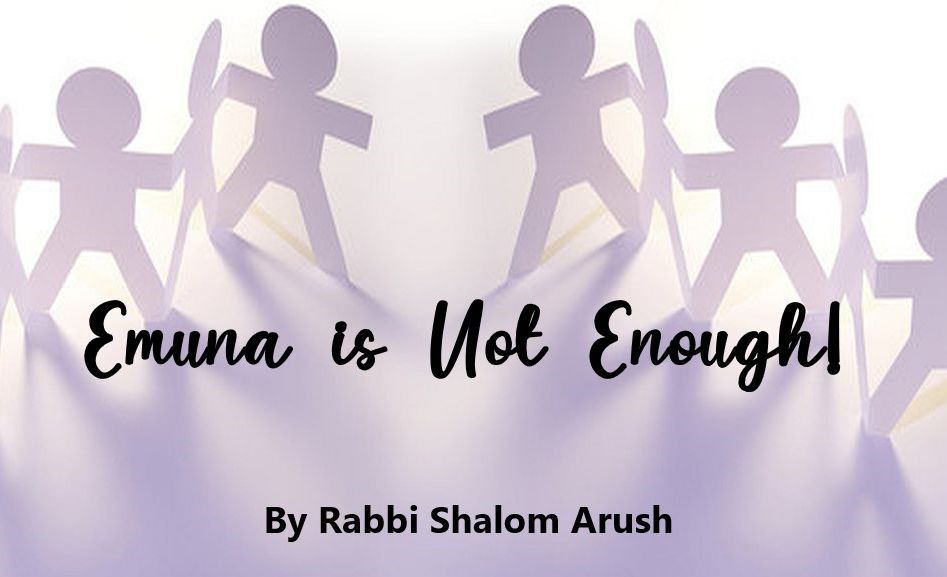
Tidal Wave of Gratitude
Rather than be swept along in the tide of the day, we need to swim against the stream of pervasive complaining and negativity.

I recently heard a talk by Rabbi Yisrael Gottlieb regarding the significance of the two inverted letter nuns that bracket two verses in the Torah portion of Beha’aloscha.
Based on a lecture from Rabbi Norman Lamm, he pointed out that the Targum uses the terminology “Nuno” which means “fish” in Aramaic. The Midrash says the inverted nuns are allusions to fish. Fish must often swim against the tide to follow their mission or path. They do not get swept along in the tide of the day.
We must also display this trait and have the courage and backbone to swim against the stream of prevailing attitudes and speech.
Why are the brackets placed specifically in this part of the Torah? Immediately after this section, is the account of the nation complaining needlessly about a lack of meat in the desert. This baseless complaining was extremely repugnant to Hashem.
We also have to be worried about getting caught up in pervasive complaining and negativity. For example, Rabbi Gottlieb points out that negativity abounds on the Internet. The pundits who express the most anger and negativity seem to get the most followers. Evil speech abounds, again these controversial posts tend to get the most get the most notice.
The Torah teaches that when everyone around us is complaining, we need to try to turn it around. If we can’t turn it around, at least we need to resist it and not get caught up in a tidal wave of negativity. Our mission is to see the good in others and in the world around us!
Rabbi Gottlieb recounted a story about Rabbi Levi Yitzhak of Berdichev, may his merit protect us, amen. One Shabbat, he saw a Jewish man smoking. He walked up to the man and said, ‘Perhaps you forgot that today is Shabbat.’ The man said ‘No, Rebbe, I know today is Shabbat.’
“He then suggested to the man: ‘Perhaps you forgot that we are not allowed to smoke on Shabbat.’ The man replied: ‘No, I realize that.’
‘Perhaps you didn’t realize what you were doing when you lit up the cigarette.’ The man answered: ‘No, Rebbe, I knew exactly what I was doing.’
Upon hearing this, Rabbi Levi Yitzhak lifted his hands up to heaven and said ‘Master of the World, look at your children! No matter how hard you try, you can’t get them to lie!’”
Rabbi Levi Yitzhak always saw the good in people. He showed us how to swim against the stream of negativity. By emulating him, we can change ourselves and slowly, slowly, this will also change the world.
Even more importantly, one of the most important aspects of Ahavat Yisrael, loving others, is looking for the good points in them! Rebbe Nachman explains that by finding something that is truly good in someone else can even turn them around to completely return to Hashem! And a hidden tzaddik recently explained that the most important thing that we need right now in these last moments before the Redemption, when the world is so, so dark – is to look for the merits in the people around us, and not harp on their faults and sins.
I am currently reading a wonderful book by Rabbi Zelig Pliskin entitled Thank You. It has 76 short chapters each giving a different piece of advice and how to cultivate an attitude of gratitude. At the end of most chapters is a short vignette illustrating the principle.
In one of the early chapters Rabbi Pliskin explains that you notice what you want to look for. When you make it a priority to build up the attitude of gratitude, you‘ll notice more things for which to be grateful. When you make it your business to become a more grateful person, your entire world will be filled with more gratitude
In his book Gateway to Happiness, Rabbi Pliskin writes that Rabbi Moshe Rosenstein related that Rabbi Yisrael Salanter often expressed his feelings of great joy on the benefit received from the shining sun that helps mankind in so many ways. Rabbi Rosenstein asked why don’t other people also feel the same joy as Rabbi Salanter? The main reason is that people feel happy when they have something others are missing. When everyone else in the world has the same thing, they don’t feel they have anything special. Rabbi Salanter felt great love for other people. Therefore, the fact that others also benefited increased his pleasure. Just as a person feels more pleasure when his children also have pleasure, so too, one who sincerely loves other people feels increased pleasure when others benefit.
Rabbi Pliskin comments that we can also derive pleasure from everything that benefits us: The trees we see, the sidewalks we walk on, the roads we travel, the streetlights at night. The fact that everyone else enjoys these benefits can increase our pleasure, rather than decrease it.
Rabbi Avigdor Miller wrote that there are four words that summarize Torah Judaism: “I thank You, Hashem.” He says that when saying thank you we should emphasize the word “You” and realize that we are thanking our Father and King. It is through gratitude that we reveal God’s presence in the world. This this is a key part of our mission – to reveal God’s kingship and instill in ourselves and others a sense of gratitude for all His beneficence.
The opposite is also true. When people want to look for the negative, and are used to seeing the negative side of everything, they’ll continue to find more and more things to complain about. I remember seeing a cartoon showing two elephants disembarking from Noah’s Ark. One elephant was frowning and said to the other: “What a lousy trip! It rained every day!”
In The Garden of Gratitude, Rabbi Shalom Arush says that complaining is a major national character flaw of the Jewish people. This culminated in the sin of the spies when the whole nation began to cry for no reason. Hashem said: “I see that you’re crying for nothing. Now I’ll give you plenty of reasons to cry.” The good news is that the positive is 500 times more powerful than the negative, and that we now know the way to end our exile. As Rabbi Arush explains in detail, the pathway to redemption is paved with expressions of sincere gratitude, especially and including the seemingly bad in life.
My daughter saw a bumper sticker with a simple but powerful message: “Get rich quick! Count your blessings.” When you make it a point to count your blessings, Hashem will give you more blessings to count. Even though it takes work and we must swim against the tide, the results are certainly worth it.










Tell us what you think!
Thank you for your comment!
It will be published after approval by the Editor.